

5 Reasons You Should Work For A Startup At Least Once. Editor’s note: Adam Arbolino is co-founder and CTO of DesignCrowd.com, a logo, web and graphic design marketplace.
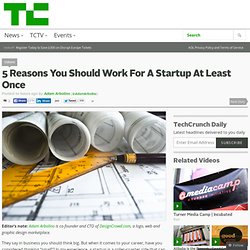
They say in business you should think big. But when it comes to your career, have you considered thinking “small”? In my experience, a startup is a roller-coaster ride that can offer you incredible career experiences and teach you some invaluable life lessons. Startups can make you more efficient than you’ve ever been, and they can help you expand your responsibility and knowledge and learn how any business, despite challenges, can effectively get off the ground.
7 Reasons Why Your Startup Will Fail (And How to Soften the Blow) Rahul Varshneya is the co-creator of Foster.fm, a platform that helps startups grow their business through social media.
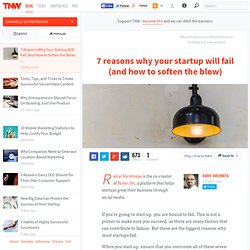
If you’re going to start up, you are bound to fail. This is not a primer to make sure you succeed, as there are many factors that can contribute to failure. But these are the biggest reasons why most startups fail. When you start up, ensure that you overcome all of these seven reasons which will increase the chances of success by multifold. Reason #1: Putting revenues before customers This is the single biggest reason why most startups fail. Never put revenues before your customers. Making a product that customers want is hard. Your business plan is absolutely worthless if the customers will not be willing to pay the price for a product. One more bit of caution.
Reason #2: Thinking too small. Why Vietnam is justifiably proud of Flappy Bird. Flappy Bird, the hottest app coming out of Asia (and possibly the world) at the moment, is from Vietnam.

Today, in Vietnam’s startup and tech scene, Flappy Bird marks a major achievement. It’s a moment of pride and triumph for the fledgling community. It’s common to hear someone say “When you ask people about Vietnam, the first thing they remember is the war. I want Vietnam to be known for innovation. I want my product to break that mold and redefine what Vietnam is.” Of course, most of its players will not know (or care) that Vietnam is where the game came from. Everybody will have their own explanations for how Dong Nguyen made the game in one night and rose to Appilionaire fame. Adding to Flappy Bird’s mystique is Dong Nguyen’s silence and avoidance of the press. Flappy Bird is surprisingly not the only runaway success from Vietnam The sad dichotomy of all this is the silence from investors and startups toward Vietnam as a whole.
The Twelve Principles of Agile Software. Stop pretending it’s all a party: The social contract of working at a startup. By Sarah Lacy On June 25, 2013 Perhaps it’s because I’ve worked my whole career in media and startups.

Lessons learned? Notes on Entrepreneurship. How to evaluate whether or not you should join a startup. Freshers, Why Should You Join A Startup? So, we had earlier written about what a student wants from a startup and here’s something from a startup as to why a student should join a startup… I have seen many bright guys in their final year, having been placed in one or couple of MNCs through campus placement but have their heart with a startup.
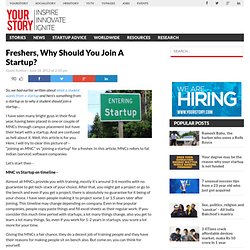
And are confused as hell about it. Well, this article is for you. Four questions before you join that start-up. I had a coffee yesterday with a friend who is looking for a marketing role.
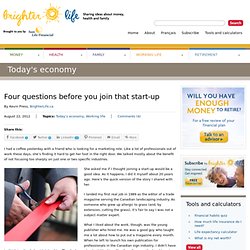
Like a lot of professionals out of work these days, she’s finding it hard to get her foot in the right door. We talked mostly about the benefit of not focusing too sharply on just one or two specific industries. 5 Things You Should Know Before Working at a Start-Up. Working for a start-up is attractive—sometimes magnetically so.
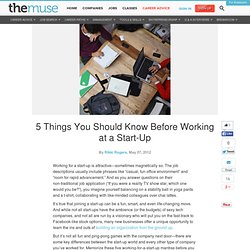
The job descriptions usually include phrases like “casual, fun office environment” and “room for rapid advancement.” And as you answer questions on their non-traditional job application (“If you were a reality TV show star, which one would you be?”) , you imagine yourself balancing on a stability ball in yoga pants and a t-shirt, collaborating with like-minded colleagues over chai lattes. Joining A Startup? Top 6 Questions You Should Ask. In most of my experience with startups, I’ve been either a founder or an advisor to the founding team.
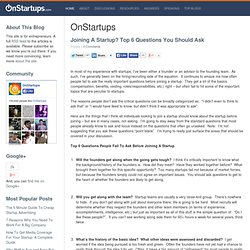
As such, I’ve generally been on the hiring/recruiting side of the equation. It continues to amaze me how often people fail to ask the really important questions before joining a startup. They get a lot of the basics (compensation, benefits, vesting, roles/responsibilities, etc.) right – but often fail to hit some of the important topics that are peculiar to startups. Don’t waste your time in crappy startup jobs. « Michael O.Church.
What I’m about to say is true now, as of July 2012.

It wasn’t necessarily true 15 years ago, and it may not be true next year. Right now, for most people, it’s utterly correct– enough that I feel compelled to say it. The current VC-funded startup scene, which I’ve affectionately started calling “VC-istan”, is– not to be soft with it– a total waste of time for most of the people involved. Startups. For all the glamour and “sexiness” associated with the concept, the truth is that startups are no more and no less than what they sound like: new, growing businesses. Now, the reverse seems to be true. So You Want To Join a Startup? - Third Year MBA. I recently received an email from a friend that contained the following (somewhat paraphrased):
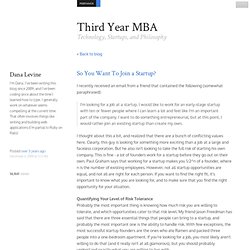
Should you join that start-up? Running the numbers. Should you join that start-up? Running the numbers. Saturday, April 9, 2011 Earlier this year I was approached to join a social media start-up as a developer. I’m not going to get into any details about it except to say that I would’ve been developer #1, tasked with taking the software from zero to beta (and beyond, presumably). And the founder of this company had plans to go through what seems to be the standard-issue VC funding and growth process.
Employee Equity: Options. A stock option is a security which gives the holder the right to purchase stock (usually common stock) at a set price (called the strike price) for a fixed period of time. Stock options are the most common form of employee equity and are used as part of employee compensation packages in most technology startups. How Long is Your Startup’s Runway? For a startup, the runway can best be described as the cash flow you have to keep operations afloat. The use of the airplane runway paints a vivid picture because once you reach the end, you are forced to either take flight or crash and burn.
Unfortunately for most startups, they usually result in the latter. However, choosing the right plane and having a clear flight plan may help you avoid tragedy. Like all things in life, if you have cash (or credit), then you have some wiggle room to make things happen. Without cash, nothing happens.